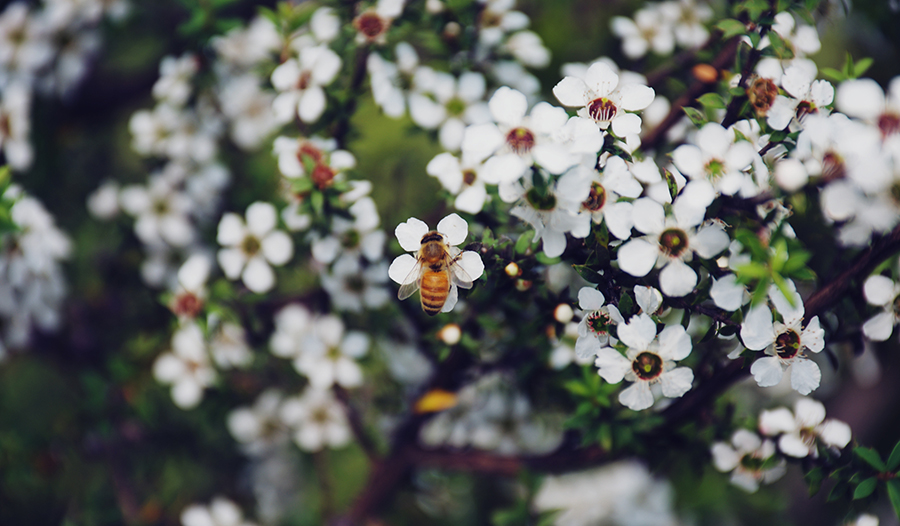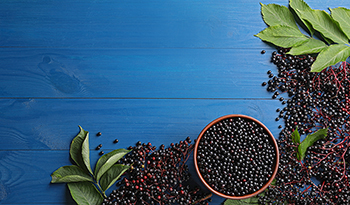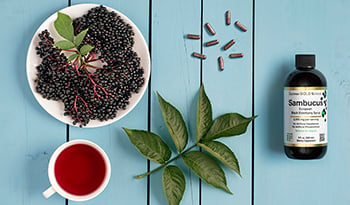7 Healing Health Benefits of Manuka Honey
OŚWIADCZENIENiniejszy blog nie ma na celu diagnozowania...
- W tym artykule:
- Where Does Manuka Honey Come From?
- What Is In Manuka Honey?
- 7 Health Benefits of Manuka Honey

The first mention of honey dates back thousands of years in the writings of the ancient Babylonians and Sumerians. Today, it is the most popular natural sweetener consumed worldwide. It is also used by some as a medical therapy.
Honey is made by bees after consuming flower nectar, which reacts with the enzymes in their stomachs. When the bee returns back to the hive, it regurgitates out a newly formed substance — which we recognize as honey — and stores it in a honeycomb. The primary purpose of the honey is to provide food for baby bees. Commercial beekeepers are able to ensure the baby bees have adequate honey to grow while removing the excess for human use.
Honey’s medical therapy use is beginning to move from alternative practitioners to mainstream medicine. In my own medical practice in Southern California, I have recommended the use of medical-grade honey for my patients with chronic leg wounds due to varicose veins, and to those with diabetic foot ulcers. In addition, I have seen wound specialists in our community recommend such therapy as part of a comprehensive approach to wound care.
Where Does Manuka Honey Come From?
Optimizing your immune system is crucial to helping improve health, happiness, and longevity. Honey has been used by people all over the planet for thousands of years and is regarded for its healing powers. However, not all honey is created equally. Some scientists believe that manuka honey can be especially beneficial to health.
Manuka honey started to gain scientific credibility in the 1980s, thanks to the microbiology research conducted by Professor Peter Molan of Waikato University, in New Zealand. Produced by European honey bees, manuka honey comes from the nectar of the manuka flower (Leptospermum scoparium), which originated in Australia and New Zealand.
This unique honey is considered a monofloral, as it comes only from the nectar of one flower. However, some manuka honey is considered multi-floral because bees rely on many types of flowers to provide nectar. Those bearing the manuka name must be independently tested to confirm the claim before being labeled as such.
What Is In Manuka Honey?
In general, honey consists of fructose, glucose, amino acids, enzymes, vitamins, and minerals. It also contains methylglyoxal, which is considered its active ingredient and not found in other honey. Most honey, including manuka, contain polyphenolic compounds and bee defensin-1, which give it its germ-fighting abilities.
Science has recently helped identify why this variety has been so useful in traditional medicine. Its antioxidant properties, in particular, can be effective for wound healing, cellular regeneration, and possibly even stomach ulcer treatment.
7 Health Benefits of Manuka Honey
1. Oral health
Many people around the world have poor oral health. Studies have shown that those with poor dentition and missing teeth are at increased risk for heart attacks and congestive heart failure. I often tell my patients to make sure they are current with their dental exams, primarily to help keep their heart-healthy. While most worry that the intake of candy and other refined sugars may increase the risk for dental cavities, the use of manuka honey, although sweet, appears to be protective due to its antibacterial benefits.
Specifically, a 2011 study showed manuka honey could help reduce harmful oral bacteria. In addition, a 2014 study in the Swiss Dental Journal showed that manuka honey could also be helpful in reducing harmful bacteria in the mouth.
As a result of these studies, amongst others, there is now natural toothpaste available that contains manuka honey as an ingredient.
2. Antimicrobial Effect
The ability to find natural ways to help the body prevent and fight infection is important, and with the concern for antibiotic overuse, researchers are looking for safer alternatives. One of the reasons honey is believed to have antimicrobial properties is that it contains a small amount of hydrogen peroxide, which destroys harmful bacteria and viruses. Manuka honey is believed to be effective against a wide range of dangerous pathogens.
A 2014 study evaluated manuka’s ability to inhibit the influenza virus. The researchers concluded, “…manuka honey has potent inhibitory activity against the influenza virus, demonstrating a potential medicinal value.” However, this study was done using cell cultures, so whether consuming the honey orally will have a similar effect is unknown.
Manuka honey was compared to another type of popular commercial honey in a 2018 study. The researchers showed that manuka had more potent antibacterial properties against two common bacteria, streptococcus mutans, and lactobacillus. Other studies have also shown that manuka honey can help fight pseudomonas and e.coli bacteria. These bacteria are common causes of infections of the skin, blood, and urine.
3. Wound Healing
Honey is known to have wound-healing properties when applied to the skin. This is believed to be due to its antimicrobial properties and its ability to maintain a moist environment. A layer of honey forms a protective barrier when placed on skin. In addition, manuka honey helps enhance both wound healing and tissue regeneration, according to studies. This is beneficial to those with chronic skin wounds.
It is well known that those with diabetes are at increased risk for infection, sometimes even leading to amputation of toes, feet, or legs. A 2014 study of the effect of manuka on diabetic foot ulcers showed benefit. Those who applied manuka honey to their dressings saw their wounds heal 25 percent faster than those without the honey therapy. Another 2014 study out of Saudi Arabia showed similar benefits of manuka honey in helping to heal diabetic wound ulcers on the lower extremities.
Lastly, a 2008 study showed that manuka honey could help kill pseudomonas bacteria, a type of bacteria common in serious diabetic foot infections and ulcers.
4. Sore Throats And Cough Relief
I am not sure about your grandmother, but I recall mine recommending honey for cough during times of illness. While not a scientist, she was definitely on to something.
A 2010 study that compared honey to medicine cough syrups showed that children with upper respiratory infections and a cough saw a reduction in coughing when given 2.5 ml of honey. Later, a 2018 study also concluded that honey did a better job relieving coughing symptoms compared to a placebo. Honey also has a soothing effect on a sore throat when taken by the teaspoon.
5. Soothe Digestive Issues
An upset stomach can have many causes, from taking antibiotics to consuming the wrong foods. Viral and bacterial infections can also create an imbalance in the gastrointestinal tract leading to rumbling, gas, bloating, or even diarrhea. This intestinal imbalance is a major reason probiotics have gained popularity over the last decade. However, manuka honey may also be a useful tool to help one optimize gastrointestinal health.
Let's consider the bacteria salmonella. Worldwide, almost 100 million intestinal infections occur every year, resulting in 150,000-200,000 deaths. Eighty percent of these infections are foodborne in origin — ensuring access to clean food and water is critical for reducing exposure along with avoiding contact with sick animals. Symptoms can include diarrhea, abdominal cramps, and fever. If the bacteria enters the blood, one may experience joint and muscle aches as well. Symptoms can persist for one week or even longer in some cases.
Studies in 2011 and 2015 suggested that manuka honey may be helpful in killing salmonella bacteria. However, more research is needed before it can be considered part of the treatment as antibiotics are considered the best course.
Clostridium difficile is another bacteria that can cause intestinal infections. People who frequently take antibiotics or are hospitalized for various reasons are susceptible to the overgrowth of this potentially deadly bug. A clostridium infection of the intestines can result in diarrhea, severe abdominal pain, and, frequently, rectal bleeding. I have seen many patients also become severely dehydrated from this microorganism.
A 2013 study concluded, “C. difficile is appreciably susceptible to manuka honey and this may offer an effective way of treating infections caused by the organism.” A 2014 study also showed manuka honey to be beneficial against this bacteria.
A 2008 study using rats showed that manuka honey can help reduce colon inflammation, which could be helpful for those with ulcerative colitis or Crohn’s disease.
6. Stomach Ulcers
Worldwide, millions of people are affected by stomach ulcers while hundreds of millions suffer from gastritis and/or heartburn. Scientists learned in the 1980s that the bacteria called helicobacter pylori caused stomach ulcers, and antibiotics have been shown beneficial as a treatment. However, some may consider honey as a therapy. For example, a 1994 study showed manuka honey could help kill helicobacter pylori bacteria. Further, a 2015 study showed that manuka honey could help prevent gastric ulcers induced by alcohol ingestion. The study used rats as test subjects and no comparable studies have been done in humans, according to my research. One should always consult with their physician prior to self-diagnosing and treating.
7. Improved Complexion
Keeping skin smooth and youthful in appearance is the goal of many. Between solar damage and low-grade bacterial infections or acne, finding the right facial cream can be helpful in achieving this goal. Manuka honey has been added to facial cleansing formulations and creams to help optimize the complexion.
Manuka honey is available in its natural form as well as in toothpaste, throat lozenges, facial creams, and oral spray.
References:
- Hayes G, Wright N, Gardner SL, Telzrow CL, Wommack AJ, Vigueira PA. Manuka honey and methylglyoxal increase the sensitivity of Staphylococcus aureus to linezolid. Lett Appl Microbiol. 2018 Jun;66(6):491-495. doi: 10.1111/lam.12880. Epub 2018 Apr 19. PMID: 29575121.
- Antibiotics 2019, 8(4), 251; https://doi.org/10.3390/antibiotics8040251
- Holmlund A, Lampa E, Lind L. Oral health and cardiovascular disease risk in a cohort of periodontitis patients. Atherosclerosis. 2017 Jul;262:101-106. doi: 10.1016/j.atherosclerosis.2017.05.009. Epub 2017 May 11. PMID: 28531825.
- Badet C, Quero F. The in vitro effect of manuka honeys on growth and adherence of oral bacteria. Anaerobe. 2011 Feb;17(1):19-22. doi: 10.1016/j.anaerobe.2010.12.007. Epub 2010 Dec 31. PMID:21195787.
- Schmidlin PR, English H, Duncan W, Belibasakis GN, Thurnheer T. Antibacterial potential of Manuka honey against three oral bacteria in vitro. Swiss Dent J. 2014;124(9):922-4. PMID: 25253413.
- Johnston M, McBride M, Dahiya D, Owusu-Apenten R, Nigam PS. Antibacterial activity of Manuka honey and its components: An overview. AIMS Microbiol. 2018 Nov 27;4(4):655-664. doi:10.3934/microbiol.2018.4.655. PMID: 31294240; PMCID: PMC6613335.
- Watanabe K, Rahmasari R, Matsunaga A, Haruyama T, Kobayashi N. Anti-influenza viral effects of honey in vitro: potent high activity of manuka honey. Arch Med Res. 2014 Jul;45(5):359-65. doi:10.1016/j.arcmed.2014.05.006. Epub 2014 May 29. Erratum in: Arch Med Res. 2014 Aug;45(6):516. PMID: 24880005.
- Beena JP, Sahoo P, Konde S, Raj NS, Kumar NC, Agarwal M. Manuka Honey: A Potent Cariostatic Agent- An in vitro Study. Int J Clin Pediatr Dent. 2018 Mar-Apr;11(2):105-109. doi: 10.5005/jp-journals-10005-1494. Epub 2018 Apr 1. PMID: 29991862; PMCID: PMC6034044.
- Niaz K, Maqbool F, Bahadar H, Abdollahi M. Health Benefits of Manuka Honey as an Essential Constituent for Tissue Regeneration. Curr Drug Metab. 2017;18(10):881-892. doi:10.2174/1389200218666170911152240. PMID: 28901255.
- Kamaratos AV, Tzirogiannis KN, Iraklianou SA, Panoutsopoulos GI, Kanellos IE, Melidonis AI. Manuka honey-impregnated dressings in the treatment of neuropathic diabetic foot ulcers. Int Wound J. 2014 Jun;11(3):259-63. doi: 10.1111/j.1742-481X.2012.01082.x. Epub 2012 Sep 18. PMID: 22985336.
- Alam F, Islam MA, Gan SH, Khalil MI. Honey: a potential therapeutic agent for managing diabetic wounds. Evid Based Complement Alternat Med. 2014;2014:169130. doi: 10.1155/2014/169130. Epub 2014 Oct 15. PMID: 25386217; PMCID: PMC4216698.
- Henriques AF, Jenkins RE, Burton NF, Cooper RA. The effect of manuka honey on the structure of Pseudomonas aeruginosa. Eur J Clin Microbiol Infect Dis. 2011 Feb;30(2):167-71. doi: 10.1007/s10096-010-1065-1. Epub 2010 Oct 10. PMID: 20936493.
- Shadkam MN, Mozaffari-Khosravi H, Mozayan MR. A comparison of the effect of honey, dextromethorphan, and diphenhydramine on nightly cough and sleep quality in children and their parents. J Altern Complement Med. 2010 Jul;16(7):787-93. doi:10.1089/acm.2009.0311. PMID: 20618098.
- Oduwole O, Udoh EE, Oyo-Ita A, Meremikwu MM. Honey for acute cough in children. Cochrane Database Syst Rev. 2018 Apr 10;4(4):CD007094. doi:10.1002/14651858.CD007094.pub5. PMID: 29633783; PMCID: PMC6513626.
- European Journal of Clinical Microbiology Infect Dis 2011 Apr;30(4):569-74.doi: 10.1007/s10096-010-1121-x.Epub 2010 Dec 17.
- BMC Complementary Alternative Medicine. 2015 Feb 26;15:32.doi: 10.1186/s12906-015-0549-z.
- Hammond EN, Donkor ES. Antibacterial effect of Manuka honey on Clostridium difficile. BMC Res Notes. 2013;6:188. Published 2013 May 7. doi:10.1186/1756-0500-6-188
- Hammond EN, Donkor ES, Brown CA. Biofilm formation of Clostridium difficile and susceptibility to Manuka honey. BMC Complement Altern Med. 2014;14:329. Published 2014 Sep 3. doi:10.1186/1472-6882-14-329
- Prakash A, Medhi B, Avti PK, Saikia UN, Pandhi P, Khanduja KL. Effect of different doses of Manuka honey in experimentally induced inflammatory bowel disease in rats. Phytotherapy Research. 2008 Nov;22(11):1511-9. doi: 10.1002/ptr.2523. PMID: 18688794.
- al Somal N, Coley KE, Molan PC, Hancock BM. Susceptibility of Helicobacter pylori to the antibacterial activity of manuka honey. J R Soc Med. 1994;87(1):9-12.
- Almasaudi SB, El-Shitany NA, Abbas AT, et al. Antioxidant, Anti-inflammatory, and Antiulcer Potential of Manuka Honey against Gastric Ulcer in Rats. Oxid Med Cell Longev. 2016;2016:3643824. doi:10.1155/2016/3643824

 Wg Dr. Eric Madrid, M.D.
Wg Dr. Eric Madrid, M.D.


